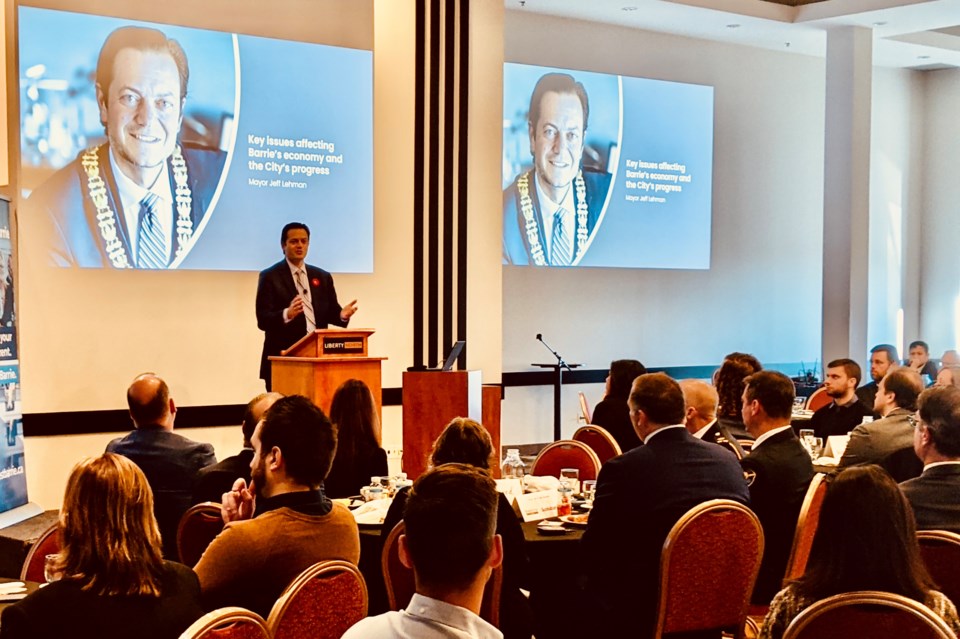Jeff Lehman makes it clear Barrie is in good shape as the outgoing mayor hands the reins to the next mayor.
At this week’s Barrie Business Progress Breakfast, with Mayor-elect Alex Nuttall looking on, Lehman laid out this city’s progress during the last decade on everything from the economy to housing to job creation and climate change.
“In government it’s easy to spend a lot of money and point to those results and try and say we fixed an issue,” Lehman said. “It’s tougher to make fundamental changes to the economy and to support the changes … that shape our community.”
Lehman, Barrie’s mayor for the last 12 years, said there has been a fundamental change to the city’s economy during the last decade, and he gave credit to the many business leaders who heard him speak at the Liberty North breakfast.
“We became less of a bedroom community. Jobs in the city grew faster than the labour force over 10 years,” he said. “And while there are still tens of thousands of people (who commute south to work), there are more people (working in Barrie) now than there were before, and this was such a key goal for us, that we not become a bedroom community.”
Lehman said the city’s business community added something in the order of 13,000 jobs during the decade before COVID, and even though 4,000 to 5,000 were lost because of the pandemic, most have now come back.
And other indicators show Barrie is in good shape, he said.
The city’s debt is down, and its credit rating is up.
Its dividend from Alectra Utilities, Barrie owns a portion of the electricity company, is in part earmarked for two major projects in the downtown, the Barrie Bayside Market and a new performing arts centre.
And Barrie is a relatively safe community, with one of the lower crime severity indexes in Canada.
But it’s not all roses.
“Despite our overly safe community and our incredibly low rate of crime, we have very severe overlapping crises in drugs and mental health and homelessness in our community,” Lehman said. “There is an assumption that they go together, and they don’t.
“There are many with mental-health challenges who are neither addicted nor homeless. They are their own issues,” he added. “But together they are particularly severe in certain areas of our city and they require longer-term response, a root cause response, rather than putting more Band-Aids on the issue, and that means we absolutely must invest in shelter and supports.
“We also have to tackle root causes of why people end up in addiction, with mental health challenges and living on the street.”
No discussion of Barrie’s future can avoid housing affordability and supply, and Lehman didn’t skirt it.
“We do have a supply issue in Canada, in Ontario. We don’t build enough homes for the people who want to live here,” he said. “We formed a housing task force (chaired by Lehman), to try to bring more supply along faster.”
Last January, city council approved a motion to support the housing affordability task force’s recommendations in principle.
They include allowing housing as a right on large, well-located commercially zoned properties; eliminating parking standards entirely for affordable, rental, supportive and social housing; offering public land to non-profit and charitable housing providers and builders; looking at tiny homes; pursuing hotel, motel conversions to create supportive housing communities; having one city planner dedicated to oversee and ensure the delivery of Barrie’s affordable housing strategy; and taking $5 million from the city’s community benefit reserve for a new supportive housing capital fund.
“Housing starts are now twice what they were two years ago, $1 billion (in 2022 building permit values) for the first time in the city’s history,” Lehman said. “This increase didn’t just happen overnight, but was the result of many, many years of work by our staff. There’s still work to be done, absolutely … but we are increasing the housing supply in Barrie, building more homes.”
Lehman also touched on climate change, the increasing frequency of severe weather, such as more rain in winter, as a challenge for local government.
“We’re going to have to adapt our infrastructure. Things like stormwater (management) are going to require a lot of investment,” he said. “And that’s going to require city council to ask our community for your help and that means money in some cases, to invest in the infrastructure things that are needed to protect us.”
This past July, for example, the $24.4-million Kidd’s Creek culvert replacement project near Barrie’s Dunlop Street West was completed to withstand a 100-year storm.
It means a new, wider, naturalized open channel between Eccles and Bradford streets, and wider culverts at Dunlop Street and Bradford Street to increase the amount of stormwater that can flow through this area and thereby reduce flooding there.
The cost breaks down to $14 million for road, watermain and sanitary sewer infrastructure, along with $10.4 million in stormwater infrastructure. This includes $3.5 million in federal funding.
Nuttall and the 2022-26 Barrie city council will be sworn in Nov. 16 at the inaugural meeting.



